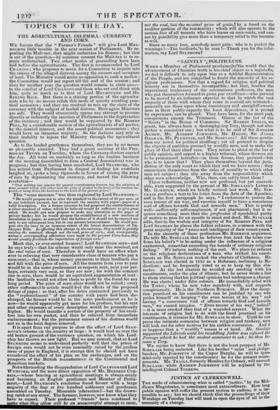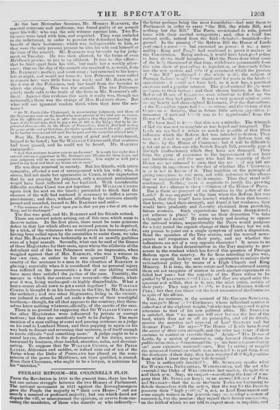JUSTICE AT CLERKENWELL.
THE mode of administering what is called "justice," by the Mid- dlesex Magistrates, is sometimes most extraordinary. How long public opinion will suffer the present system to endure, it is im- possible to say; but we should think that the proceedings of their Worships on Tuesday last will tend to open the eyes of all to the necessity of a change.
At the last November Sessions, Mr. MORRIS BARNETT, the musical cempeser and performer, was found guilty of an assault upon his wife; who was the sole witness against him. Two Po- liemien were tried with him, and acquitted. They were included in the indictment, in order to prevent the defendant having the benefit of their testimony; which was indispensable to him, as they were the only persons present be ides his wife and himself at the time of the assault. Mr. B titenier was breueht up for judg- meta on Tuesday. He was then allowed, by the forms of even Middlesex justice, to put in an affidavit. It was to this effect— that be lived apart from his wife, but made her a weekly allow- ance; that on the day of the assault she received it, as usual, from Mr. BARNEres mother, and went away ; but returned to his house late at night, and would not leave it ; two Policemen were called to remove her: very little force was used; and Mr. BARNErr, ut the d ,sire of the Policemen, took her hand from the banister to which she clung. This was the assault. The two Policemen jointly made oath to the truth of the facts in Mr. BARNErr's affi- davit. Against this-evidence (for such it really was, though not technically) there was the charge of Mrs. BARNETT alone. But what will our ignorant readers think when they hear the sen- tence?
" Sir W. Curtis (the Chairman), in proneuncing judgment, said those of the Magistrates now on the bench who were present at the trial saw no reason, from Me affidavits put in, to alter the opinion they then formed. The sen tence of the Coot was, that he pay a fine of 10/. to the Kiog ; that he be im- prisoned three mat/is in the House of Correction ; that he find bail to keep the peace at the end of that time, fir twelve months towards his wife ; and that be be further imprisoned till such fine be paid and the securities entered into."
Poor Mr. BARNETT, in an agony of grief and astonishment, begged to be heard ; but Sir WILLIAM CURTIS said, that sentence had been passed, and he could not be heard. Mr. BARNETT exclaimed- " And that sentence is utter ruin to me for ever ! It is only last night that I entered into an engagement at Mr. Braham's new Theatre for three years, and your judgment will be my complete destruction. You might as well put a pistol to my bead and blow my brains out at once." He was then removed in custody. But his friends, with active sympathy, effected a sort of arrangement with his wife; who, it seems, had not made her appearance in Court, in the expectation that by not praying for judgment, only a nominal punishment would have been inflicted on her husband. With considerable difficulty another Court was got together. Sir WILLIAM CURTIS again took his seat on the bench ; pretended to think that the absence of the wife had rendered it necessary to inflict a severe punishment; and then, without alluding to the sentence already passed and recorded, turned to Mr. BARNETT and said- " The sentence of the Court upon you is, that you pay a fine of 10/. to the King, and he discharged."
The fine was paid, and Mr. BARNETT and his friends retired. There are several points arising out of this case which seem to deserve notice. In the first place, there must be some grievous defect in that law which allows an accused person to be deprived, by a trick, of the witnesses who would prove his innocence,—for, having been called upon by the constables to assist them, we take it that Mr. BARNETT was technically as well as morally guiltless even of a legal assault. Secondly, what can be said of the fitness of those Magistrates for their seats, upon whom the affidavits of the defendant and of the two Policemen made no impression, when weighed against that of Mrs. BARNETT, who was a witness in her own case, or rather in her own quarrel? Thirdly, the cruelty of the sentence to a man in the situation of BARNETT is glaring; especially when it is considered that no personal injury was inflicted on the prosecutrix: a fine of one shilling would have more than satisfied the justice of the case. Fourthly, the manner in which the sentence was reversed—the offence, what- ever it was, being unchanged—is highly discreditable. What a hurry-scurry about town to get a court together Sir WILLIAM CURTIS is brought feat his business in the City, by Mr. BEAZLEY the architect ; and two other Magistrates, living in the vicinity, are induced to attend, and set aside a decree of their worshipful brethren,—though, for all that appears to the contrary, they them- selves knew nothing whatever,officially, of the merits of the case. There is no ground for supposing that Sir WILLIAM CURTIS or the other Magistrates were influenced by private or corrupt motives; but they are manifestly unfit to be Judges. The mere mention of a man calling at court and passing sentence as a judge on his road to Lombard Street, and then popping in again on his way back to dinner and reversing that sentence, is of itself enough to excite ridicule "and something more." A judge ought to be a sound lawyer, devoted to the performance of his duties, unem- barrassed by business, clear-headed, attentive, calm, and discrimi- nating. To suppose that Sir WILLIAM CURTIS, or Sir PETER LAURIE, Alderman and saddler, or indeed nine out of ten of the Tories whom the Duke of PORTLAND has placed on the com- mission of the peace for Middlesex, are thus qualified, is absurd. Even their Chairman, who ought to be a lawyer, is notorious for his "mistakes."



























 Previous page
Previous page